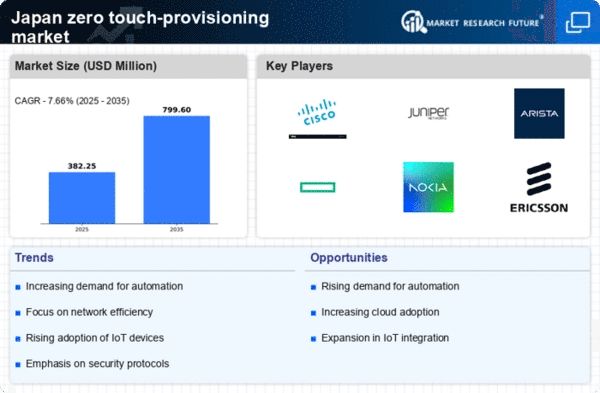Emergence of 5G Technology
The emergence of 5G technology in Japan is poised to revolutionize the zero touch-provisioning market. With its promise of faster speeds and lower latency, 5G enables more efficient network management and device provisioning. This technological advancement allows for the deployment of zero touch-provisioning solutions that can handle the increased data traffic and connectivity demands of modern applications. As 5G networks expand, the zero touch-provisioning market is likely to experience significant growth, with estimates suggesting a potential increase in market size by 30% within the next three years. This growth is driven by the need for scalable and agile network solutions that can support the evolving digital landscape.
Growing Adoption of IoT Devices
The growing adoption of Internet of Things (IoT) devices in Japan is a key driver for the zero touch-provisioning market. As more organizations integrate IoT solutions into their operations, the complexity of managing these devices increases. Zero touch-provisioning technologies simplify the deployment and management of IoT devices, allowing for automated configurations and updates. This trend is reflected in the increasing number of IoT devices expected to reach 1 billion by 2026 in Japan. The zero touch-provisioning market stands to benefit from this proliferation, as businesses seek efficient ways to manage their expanding IoT ecosystems while ensuring seamless connectivity and security.
Increased Focus on Cybersecurity
In Japan, the heightened focus on cybersecurity is driving advancements in the zero touch-provisioning market. As cyber threats become more sophisticated, organizations are compelled to adopt secure provisioning methods that minimize vulnerabilities. Zero touch-provisioning technologies offer enhanced security features, such as automated device authentication and configuration, which are essential in safeguarding sensitive data. The market is witnessing a shift towards solutions that integrate security protocols within the provisioning process. This trend is expected to contribute to a projected market growth of 20% over the next few years, as companies prioritize cybersecurity in their network management strategies.
Shift Towards Remote Work Solutions
The shift towards remote work in Japan has significantly influenced the zero touch-provisioning market. As organizations adapt to flexible work arrangements, the need for robust and easily deployable network solutions has become critical. Zero touch-provisioning technologies enable IT teams to manage devices remotely, ensuring that employees can access necessary resources without physical intervention. This trend is underscored by a reported increase in remote work adoption, with approximately 40% of companies implementing hybrid work models. Consequently, the zero touch-provisioning market is likely to see accelerated growth as businesses prioritize solutions that support remote operations while maintaining security and efficiency.
Rising Demand for Seamless Connectivity
The zero touch-provisioning market in Japan experiences a notable surge in demand for seamless connectivity solutions. As businesses increasingly rely on digital infrastructure, the need for efficient network management becomes paramount. This trend is reflected in the growing adoption of zero touch-provisioning technologies, which facilitate rapid deployment and configuration of network devices. According to recent data, the market is projected to grow at a CAGR of 15% over the next five years. This growth is driven by the necessity for organizations to maintain uninterrupted connectivity while minimizing operational costs. The zero touch-provisioning market is thus positioned to benefit from this rising demand, as companies seek to enhance their network capabilities without the burden of manual configurations.
















